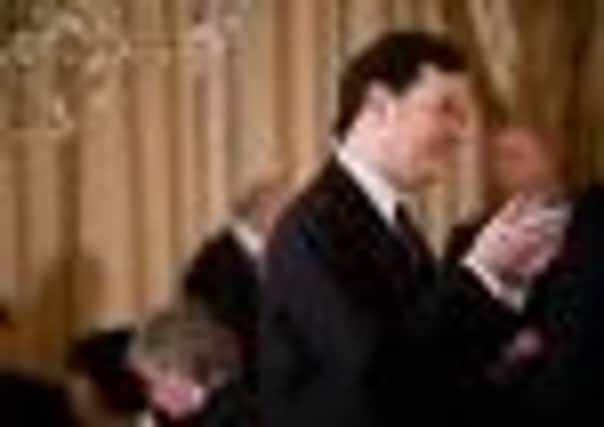Leaders: Chancellor must stamp out tax avoidance before it’s too late


But while the vast majority of ordinary people sticks to the rules, or is even ignorant of its entitlements, rich people who employ clever lawyers and accountants are able to do more. It has to stop and chancellor George Osborne, if he is true to his word in interviews yesterday, will do some of that in his Budget this week.
Some of the recent revelations regarding how the rich avoid paying what most would regard as their due make legal tax avoidance sound like illegal evasion. While ordinary taxpayers buying and selling their home have to stump up stamp duty, the wealthy are reported to have set up companies to own their properties. The companies are usually incorporated in secretive tax havens, whose purpose is to make money out of helping rich companies and people avoid tax in their homeland.
Advertisement
Hide AdAdvertisement
Hide AdIt is said on behalf of those who use these methods that they derive no tax benefit from what most of us would view as odd arrangements. Others who have benefited from them in the past have said the avoidance of capital gains in this way does not feel morally right, a sentiment which we suspect most people, who cannot afford those expensive accounts and lawyers, would agree with.
The matter illustrates the two sides of the tax debate coin. On the one side is the demand that the rich should pay their share, indeed a bigger share than most, back to the society that enabled them to become wealthy. But if a government pushes tax rates up to penalising percentages, as the Labour government did with a 98 per cent top income tax rate in the 1960s, people who pay such rates will rush to find ways of avoiding it.
The 50 per cent tax on incomes of more than £150,000, introduced by the last Labour government as a way of dealing with big hole in public finances caused by the financial crisis and the recession, risks also encouraging tax avoidance thus defeating the point of the tax increase. Worse, it risks turning tax avoidance into a normal part of life. The example of Greece shows the potential disaster as the end of this road. It is a road we do not want to go down.
But if Mr Osborne wishes to tackle this issue, then he must also demonstrate that he is rather more interested in the problems of low- and middle-income earners. Raising the personal income allowance threshold much closer to the £10,000 advocated by his Lib Dem partners would be a praise- worthy move, not least because it would also give millions of households more money to spend in the shops. Since retailing is such a large part of the economy, it would also help prevent job losses and stimulate much-needed economic growth.
Gut reaction has unintended consequences
Legislative bans, rather than trying to encourage people to take more responsibility for their own lives, seems to have become the Scottish Government’s preferred means of dealing with social ills. But this may be a method which has unintended consequences.
It is true that the ban on smoking in public places seems to have curbed consumption of cigarettes and caused a decline in the illnesses associated with it. Bans on cheap alcohol promotions are already claimed to have the same effect, though more hard evidence of this would be welcome, and it seems that the UK government is about to join the Scottish Government on going further by instituting minimum pricing for alcoholic drink.
Now the Scottish Government wants to tackle Scotland’s obesity problem by calling on the Westminster government to ban the advertising of fatty, processed foods such as burgers and sausages on television before 9pm when many children may be watching. By such means, it is calculated, children will somehow switch to low-fat foods. Even if the UK government agrees, and it looks like it will not, this seems unlikely. Most of what children eat is provided by the parents who will still be able to watch the high-fat adverts later at night. And younger teenagers will still be able to visit burger bars and chippies with their chums and buy as much fat as they like.
Meanwhile, government bans will have created a country where people get used to being told what to do by the state. That might be a politician’s dream, but it hardly smacks of being a healthy, self-reliant, independent and responsible society.
Coaches should face up to results of mistakes
Advertisement
Hide AdAdvertisement
Hide AdWho’d be a sports coach? Just when everything was going Celtic’s way with the collapse of their bitterest rival they came up short against Kilmarnock and blew a potential treble. But despite countless missed opportunities, Neil Lennon cannot escape responsibility. What of Ally McCoist? The darling of Govan is holding Rangers together in the club’s darkest hour, but before the Craig Whyte facade was exposed for all to see he blew a 15-point lead at the top of the league.
Then there is Scotland rugby coach Andy Robinson. If sport, as the cliche goes, is a results business, Robinson cannot but look back at this season and conclude that Scottish rugby is almost as bust as Rangers.
No wins in the Six Nations, some brave defeats, a surrender in Dublin and an abject performance in Rome. His team is going backwards faster than an Irish scrum at Twickenham. To say no-one could do any better is almost to say the Scottish rugby community should get used to the idea we are now a nation of rugby losers.
That there is failure at the heart of Scottish rugby should now be beyond question but there is no Craig Whyte to blame. The failure needs to be identified and if those responsible say they cannot bring improvement, then it is time for change.